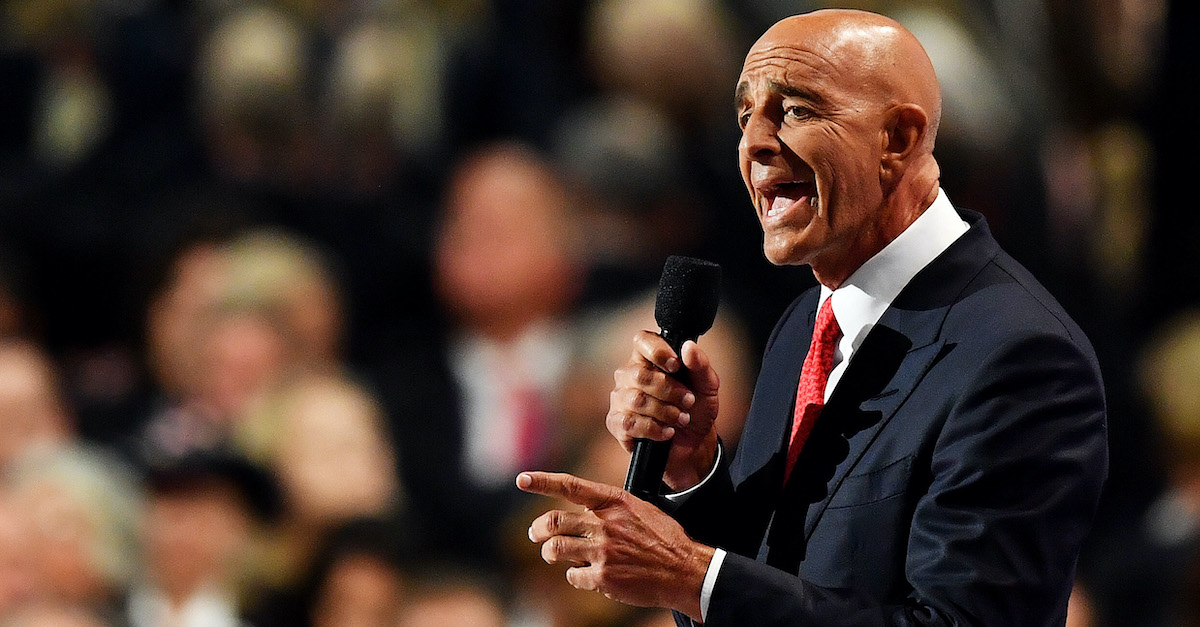
Thomas Barrack speaks at the Republican National Convention.
Federal prosecutors roasted billionaire Tom Barrack for his “baseless speculation” that the government waited until Donald Trump left office before prosecuting him for allegedly acting as an unregistered agent of the United Arab Emirates.
Indicted last July, Barrack has been accused of the UAE’s bidding while serving as the chair of Trump’s inaugural committee. Prosecutors say that Barrack and his assistant Matthew Grimes worked with senior UAE national security officials to influence public opinion and Trump’s foreign policy. The men have pleaded not guilty.
In an email to their co-defendant Rashid Sultan Rashid Al Malik Alshahhi, who remains at large, Barrack allegedly referred to the Emiratis as the “home team” for whom he “nailed” an interview. The conspiracy spanned from May 1, 2016, until well past Trump’s inauguration in January 2017, according to the indictment.
Prosecutors say that Barrack compounded his legal jeopardy years later by lying to the FBI in June 2019.
In their motion to dismiss, Barrack and Grimes claimed that the time lapse between that time and their indictment showed that prosecutors sat on their allegations until President Joe Biden got into office.
Assistant U.S. Attorney Ryan C. Harris told a federal judge that they have no evidence of that.
“Barrack has not shown—and cannot show—that the government caused any pre-indictment delay in this case to gain a tactical advantage. Barrack merely conjectures that the ‘Department of Justice delayed indictment until a new presidential administration came into power,” which raises, in Barrack’s mind, “‘the very real potential that politics was the motivating force for the belated charges,'” prosecutors wrote in a legal brief on Monday. “But rhetoric aside, Barrack offers nothing beyond baseless speculation in support of his claims.”
“As discussed above, any delay in bringing the indictment was the result of continued investigation and evaluation of the evidence,” the document continues. “Even if the Court were to determine that there was some sort of delay in seeking the Indictment, Barrack’s motion should be dismissed because he failed to show that the government acted improperly to obtain a tactical advantage.”
Prosecutors say that Barrack did not explain what advantage they would have gotten from any “supposed delay.”
“In sum, not only does Barrack fail to demonstrate actual, non-speculative prejudice owing to pre-indictment delay, but he also fails to establish that the government intentionally manufactured any alleged delay to gain a tactical advantage over him,” the 87-page legal brief continues. “He has ‘offered no credible evidence to suggest that the Government tarried in bringing charges against him solely to gain some prosecutorial advantage.'”
Barrack is charged under Section 951, the same statute used against Russian agent Maria Butina, but prosecutors rejected the defendants’ claim that the statute was intended to combat “espionage or traditional notions of spying and subversive activity.”
“Section 951 arose out of concerns after World War I about foreign governments’ attempts to surreptitiously gather information from the United States, as well as those governments’ attempts to use U.S.-based individuals to influence the U.S. government, the U.S. media, and the U.S. polity,” the brief notes.
Attorneys for Barrack and Grimes did not immediately respond to emails requesting comment.
Read the prosecutors’ brief, below:
(Photo by Jeff J Mitchell/Getty Images)